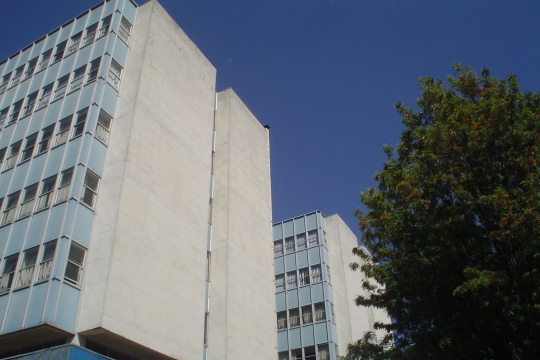The center supports green and climate-resilient development in Ethiopia as a knowledge backstop. ECRC's core functions include undertaking policy oriented research on the economics of climate and environment in Ethiopia, conducting real time impact evaluation of the Climate Resilient Green Economy (CRGE)'s implementation process, and serve as an interaction hub for research and policy. The center also plays an important role in building domestic analytical capacity on climate related issues as well as developing a data and knowledge repository of Ethiopia’s green growth experience. Download our info flyer here
The center has a significant core of research fellows and associates, capable of addressing a range of topics in the Environment and Development research space, and to deliver research efforts that address national policy needs. ECRC has 16 fulltime professional staff, 6 of which are PhD holders designated as Senior Research Fellows. The center’s research projects also involve associates from universities in the country, such as Addis Ababa University, Hawassa University, and Makelle University. ECRC has also become a focal point of collaboration from domestic and international institutions working on environment and climate issues.
Achievement in the international front include, successful bids for competitive grants, including from the GCRF, UK Research Council, WRI, Sida, IDRC, EEG, Swiss National Science Foundation and Norwegian Embassy. Locally, the center has forged partnerships with Ministry of Environment Forest and Climate Change (MEFCC), Ministry of Finance and Economic Cooperation (MoFEC), the World Bank, Ethiopian Environment and Forestry Research Institute (EEFRI) and other stakeholders to deliver on key CRGE-related initiatives including the Ethiopia Country Environmental Analysis (CEA); operationalization of the CRGE M&E; exploration of carbon pricing policy in Ethiopia; and the organization of the Annual Conference on the CRGE. In the last five years, the centre has carried out a commendable amount of quality research and policy outreach. There are 16 research projects currently underway with aggregate project budgets of USD $4.1 million.
Rationale
Ethiopia has outlined a strategy for a Climate Resilient Green Economy (CRGE). The overall vision of the CRGE strategy is to sustain fast economic growth while increasing resilience and keeping emissions low. This strategy is an important step in framing the direction of Ethiopia´s development and can potentially make Ethiopia a leader in green growth. The implementation of the CRGE strategy needs to be supported by a policy-oriented research and knowledge management process. This necessitates a sustained and dynamic partnership between the domestic and international research community, as well as government and non-government stakeholders involved in the design and implementation of the CRGE.
Vision
Contribute to the realization of Ethiopia’s Climate Resilient Green Economy development vision by being a leading policy research center on the economics of climate and environment.
Mission
- Conduct rigorous research on the linkages between climate change and environment on one hand and different sectors of the economy on the other by focusing on identifying strategies for sustainable economic development.
- Support evidence-based policymaking and implementation in Ethiopia by undertaking impact evaluation studies of climate-related interventions and policies, with a focus on the implementation of the CRGE strategy.
- Develop data and knowledge management system on Ethiopia´s green growth experience; and share this information with stakeholders.
- Develop domestic capacity on the economics of climate change and environment, thereby improve Ethiopia's longer-term capacity to deliver on the CRGE goals.
Programs
The center has four main core programs:
- Policy Research and Impact Evaluation (PRIE) program;
- Policy Interaction and Communication (PIC) program;
- Data Management and Knowledge Repository (DMKR) program;
- Capacity Building (CB) program
Policy Research and Impact Evaluation (PRIE)
The PRIE program will take a principal role in the center, and the other programs are built around it. The PRIE program focuses on the following thematic areas
- Sustainable agriculture
- Sustainable water management
- Sustainable energy transition
- Sustainable forest management
- Sustainable green industrialization
- Sustainable urbanization
Capacity Building (CB)
The capacity building component of the ECRC is designed with the aim of improving the analytical capacity of relevant governmental and non-governmental stakeholder organizations on CRGE-related issues. In addition, it plans to enhance teaching and research relevant to CRGE development pathways in universities and think tanks. Given the immense potential of the ECRC to build the capacity of researchers and data management professionals at each stage of the research process, it aims to be a liaison with international institutions for advanced research methods and tools to carry out research activities.
Policy Interaction and Communication (PIC)
The Policy Interaction and Communication program will have two major roles in facilitating the ECRC objectives. The first is focused on communication (facilitating the PRIE research processes and ensuring that research outputs reach the relevant stakeholders). The second major activity will be planning and implementing a knowledge management strategy in relation to creating a platform to effectively gather and share knowledge among stakeholders on CRGE implementation and beyond.
Data Management and Knowledge Repository (DMKR)
DMKR will provide easy access to quantitative data and information on existing research outputs for the research teams of the PRIE to check whether the identified research gap has been addressed. At the identification of methods stage, researchers will be able to easily access literature on frontier knowledge and methodology from the knowledge repository. The DMKR will be actively involved in the data collection process to produce high-quality data that can be used for further research. It will also provide qualitative data to enrich analytical results with contextual information. The unit ultimately documents the inputs and outputs of each research project, including the data collected, the literature reviewed and the research outputs, for further use by other research endeavors of ECRC and its partners.
